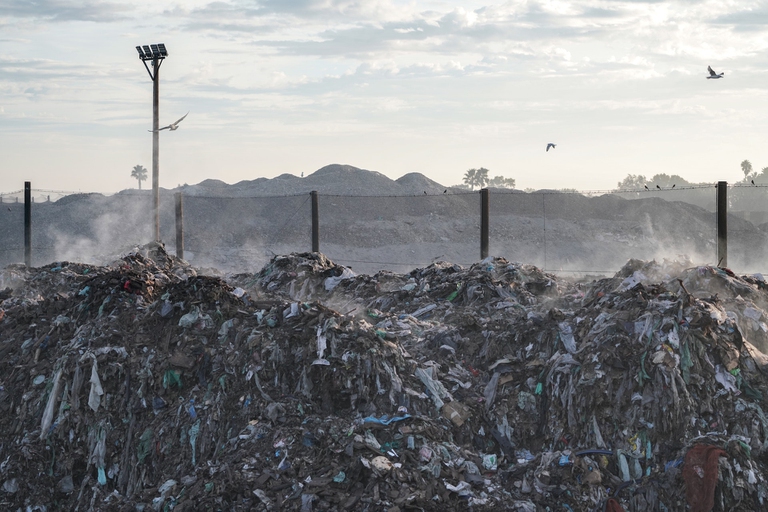https://www.lifegate.it/lapp-piu-scaricata-negli-usa-temu-e-anche-peggio-di-shein
- |
- Temu is a virtual marketplace, that is, a retailer that follows the same ultra-fast fashion model as Shein, i.e. an abundant offering of products at negligible costs.
- Launched in the US market in September 2022, today it is the most downloaded app in the States, also thanks to the million-dollar commercial aired during the last Super Bowl.
- The prices are even lower than those of Shein, but they share dark exploitation scenarios with their main competitor and, last but not least, they represent a significant threat with regards to environmental pollution.
Shop like a billionaire:with this claim Temu was presented to the general public during the Super Bowl last February 12th at the State Farm Stadium in Glendale, Arizona, the most important sporting event in the United States.It is such a colossal event that it can be taken as a point of comparison for reporting similar events in other disciplines:“It's the Super bowl of football”, or “it's the Super bowl of skiing” and, in its latest edition, it was seen by 113 million viewers.During the halftime guests of the caliber of perform Rihanna, as during the last edition, Lady Gaga, Beyoncé or i Coldplay and airing a commercial during the break is expensive 7 million dollars, Temu's aired twice during the match.A figure, 14 million dollars, no small feat for a brand unknown to most people launched on the US market just five months earlier, in September 2022.According to data released by the market analysis company Sensor Tower, the Temu commercial aired during the Super Bowl generated an instant increase in downloads and daily active users of 45 percent and since then they have never stopped growing, making the brand's app, the most downloaded in the States.The company that owns Temu (which is based in Boston), the Chinese PDD Holdings, declared a turnover of 4.9 billion dollars compared to the third quarter:a figure 65 percent higher than the period of the previous year which led the total value to exceed 100 billion dollars.But what is behind Temu's enormous success, beyond a successful million-dollar commercial?

Temu's strategy
Temu's business model, which ships in more than fifteen markets around the world, from Mexico to New Zealand via the United Kingdom and Italy, is similar to that of the main Chinese platforms such as Shein, Wish and Alibaba:sell huge quantities of product to incredibly low prices.However, Temu stands out for its fusion between shopping and entertainment, introducing experiences of gamification where customers can play to win prizes and promoting a shared shopping experience through group purchasing:a very popular concept in Asia that allows customers to form groups and take advantage of bulk discounts.More users buy the same product and the more its price drops taking up the concept again: Team up, price down.Furthermore, Temu is not limited to clothing, but offers a very vast range of products which also include household items and electronics at prices, if possible, even lower than those offered by Shein:a couple of wireless earpods it can even cost just one 2 euros, a 4.99 smartwatch and a evening dress 12 euros, all inclusive of shipping and free returns.Not only that:many customers who have joined the campaign launched on social media in which the more you convince others to sign up, the more credit you earn, do not pay at all.
With these prices and these tricks the claim also returns: “buy like a billionaire”.It is not surprising that Temu's sales exceed those of Shein by 20 percent.Last but not least:Temu, unlike Shein, it does not produce but simply operates as a marketplace, directly connecting suppliers and consumers and, in fact, mainly dealing only with shipping.Furthermore, it allows Chinese producers to ship directly to the West without having to rely on local distribution centers, as Amazon does for example.But, apart from this, how are they Are such low prices justifiable? There is no production and there are no physical stores, but what pressure will the brand put on its suppliers to ensure that they maintain such a high production volume at such low prices?
The exploitation of Uyghurs and the battle with Shein
A possible answer lies in ainvestigation conducted by Bloomberg on the Temu supply chain both in the USA and in China which highlighted how a good part of the products offered for sale by the marketplace belong to companies located in Xinjiang, a region where forced labor is the rule and which the United States has banned:nothing that comes from this region can be marketed on American soil.Among the offending products there would be sunglasses, sandals, food containers and kitchen and bathroom utensils:the shadow raised by the investigation is that they come from factories that force their employees to work in unsafe conditions semi slavery, the US State Department reports terrible abuses against the Uyghur people who, it appears from a series of reports from associations and from the testimonies of the Uyghurs themselves, are locked up by the thousands in detention camps and forced into forced labor.
In fact, in Xinjiang, an autonomous region located between Mongolia, Russia, Kazakhstan, Kyrgyzstan, Tajikistan, Afghanistan, Pakistan, India, and Tibet, approximately 11 million Uyghurs, population Turkish-speaking Muslim, originally from the region and systematically harassed by the central government, so much so that Mike Pompeo, United States Secretary of State during Donald Trump's presidency, used the word genocide to indicate both the security policies in place in the region, including the extremely rigid birth control policy, and the imprisonment in internment camps which have the specific mission of re-educate members of Islamic minorities in the region and where the forced labor scenario fits.Temu for his part does not have of any system to ensure compliance with the Law on the Prevention of Forced Labor of Uyghurs (Uflpa).

Even Temu's main competitor, i.e Shein, is accused of producing in the Xinjiang region and, as if that were not enough, the two giants of labor exploitation are engaged in a legal case which sees them opposed. Temu in fact accused Shein in Massachusetts court, that he created exclusive contracts with independent manufacturers in China, preventing them from working with Temu.The company claims that Shein entered into the agreements in an attempt to outcompete Temu in US markets.In short, a clash of titans.
The consequences of ultra fashion fashion on the environment
If the fast fashion has generated a lot of problems for the environment, theultra fast fashion it is the new frontier of hyper-consumerism that represents a enormous threat in terms of pollution.Brands like Temu and Shein are constantly bringing new products to market:if with fast fashion we have reached 52 product drops in a year, or one per week, with ultra fast fashion we find ourselves new items to put in your cart every single day.The incredibly low prices, in addition to presupposing terrible exploitation scenarios, also entail something else:there poor quality of products, whose life is really short.This means that we will see even more products, both textile and non-textile, poured into landfill.Not to mention the fact that on a platform like Temu there is no trace of natural fibers or low-impact materials, the vast majority of textile products are polyester, which is a derivative of petroleum and, as such, highly polluting.Other ultra fast fashion brands are Chinese Romewe, which is also owned by the same fund that controls Shein, the American Zaful and the Swiss Tally Weijl.The leadership position, which until just under a year ago was undisputedly held by Shein, has today been put into crisis by the new rising star of this world of exploitation and shoddy products, namely Temu.As regards Shein, however, it was estimated that, with his 470 thousand models available every day, it produces the same amount of CO2 as 180 coal-fired power plants.

Temu between malware suspicions, data security and user discontent
If all this wasn't enough to discourage purchases on Temu, a few months ago the online retailer also faced shadows regarding the user data management:from the most common suspicions about the unorthodox treatment of advertising to the more serious ones according to which the app contains a malware capable of copying all the data present on the smartphones on which it is installed.At the moment these are just rumors, while what is real is the increasingly lower rating with which purchases are evaluated:between delays in deliveries and non-compliant products, there are quite a few negative comments that have hit Temu lately.
